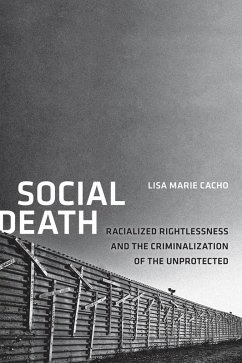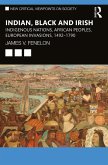Winner of the 2013 John Hope Franklin Book Prize presented by the American Studies Association
A necessary read that demonstrates the ways in which certain people are devalued without attention to social contexts
Social Death tackles one of the core paradoxes of social justice struggles and scholarship-that the battle to end oppression shares the moral grammar that structures exploitation and sanctions state violence. Lisa Marie Cacho forcefully argues that the demands for personhood for those who, in the eyes of society, have little value, depend on capitalist and heteropatriarchal measures of worth.
With poignant case studies, Cacho illustrates that our very understanding of personhood is premised upon the unchallenged devaluation of criminalized populations of color. Hence, the reliance of rights-based politics on notions of who is and is not a deserving member of society inadvertently replicates the logic that creates and normalizes states of social and literal death. Her understanding of inalienable rights and personhood provides us the much-needed comparative analytical and ethical tools to understand the racialized and nationalized tensions between racial groups. Driven by a radical, relentless critique, Social Death challenges us to imagine a heretofore "unthinkable" politics and ethics that do not rest on neoliberal arguments about worth, but rather emerge from the insurgent experiences of those negated persons who do not live by the norms that determine the productive, patriotic, law abiding, and family-oriented subject.
A necessary read that demonstrates the ways in which certain people are devalued without attention to social contexts
Social Death tackles one of the core paradoxes of social justice struggles and scholarship-that the battle to end oppression shares the moral grammar that structures exploitation and sanctions state violence. Lisa Marie Cacho forcefully argues that the demands for personhood for those who, in the eyes of society, have little value, depend on capitalist and heteropatriarchal measures of worth.
With poignant case studies, Cacho illustrates that our very understanding of personhood is premised upon the unchallenged devaluation of criminalized populations of color. Hence, the reliance of rights-based politics on notions of who is and is not a deserving member of society inadvertently replicates the logic that creates and normalizes states of social and literal death. Her understanding of inalienable rights and personhood provides us the much-needed comparative analytical and ethical tools to understand the racialized and nationalized tensions between racial groups. Driven by a radical, relentless critique, Social Death challenges us to imagine a heretofore "unthinkable" politics and ethics that do not rest on neoliberal arguments about worth, but rather emerge from the insurgent experiences of those negated persons who do not live by the norms that determine the productive, patriotic, law abiding, and family-oriented subject.
Dieser Download kann aus rechtlichen Gründen nur mit Rechnungsadresse in A, D ausgeliefert werden.









